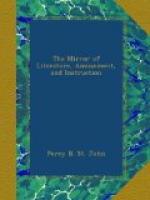Mr. Southey, observing with what general accuracy this apostle of the people writes the English language, notwithstanding all the disadvantages under which his youth must have been passed, pauses to notice one gross and repeated error. ‘The vulgarism alluded to,’ says the laureate, ’consists in the almost uniform use of a for have—never marked as a contraction, e.g. might a made me take heed—like to a been smothered.’ Under favour, however, this is a sin against orthography rather than grammar: the tinker of Elstow only spelt according to the pronunciation of the verb to have, then common in his class; and the same form appears a hundred times in Shakspeare. We must not here omit to mention the skill with which Mr. Southey has restored much of Bunyan’s masculine and idiomatic English, which had been gradually dropped out of successive impressions by careless, or unfaithful, or what is as bad, conceited correctors of the press.
The speedy popularity of the Pilgrim’s Progress had the natural effect of inducing Bunyan again to indulge the vein of allegory in which his warm imagination and clear and forcible expression had procured him such success. Under this impression, he produced the second part of his Pilgrim’s Progress; and well says Mr. Southey, that none but those who have acquired the ill habit of always reading critically, can feel it as a clog upon the first. The first part is, indeed, one of those delightfully simple and captivating tales which, as soon as finished, we are not unwilling to begin again. Even the adult becomes himself like the child who cannot be satisfied with the repetition of a favourite tale, but harasses the story-telling aunt or nurse, to know more of the incidents and characters. In this respect Bunyan has contrived a contrast, which, far from exhausting his subject, opens new sources of attraction, and adds to the original impression. The pilgrimage of Christiana, her friend Mercy, and her children, commands sympathy at least as powerful as that of Christian himself, and it materially adds to the interest which we have taken in the progress of the husband, to trace the effects produced by similar events in the case of women and children.
“There is a pleasure,” says the learned editor, “in travelling with another companion the same ground—a pleasure of reminiscence, neither inferior in kind nor degree to that which is derived from a first impression. The characters are judiciously marked: that of Mercy, particularly, is sketched with an admirable grace and simplicity; nor do we read of any with equal interest, excepting that of Ruth in Scripture, so beautifully, on all occasions, does the Mercy of John Bunyan unfold modest humility regarding her own merits, and tender veneration for the




